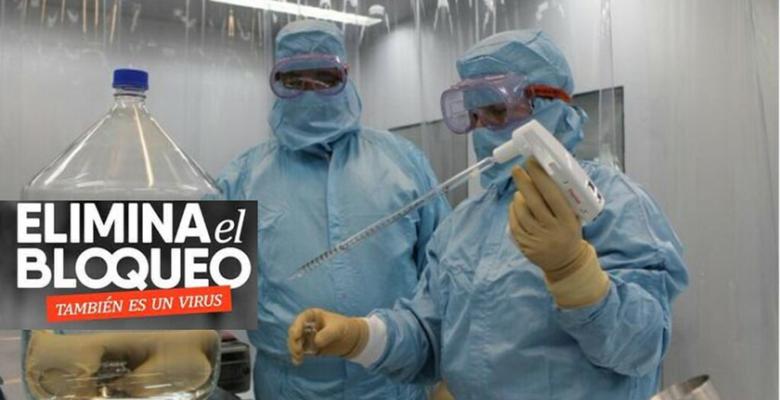Threat on Cuba: how the US blockade affects Cuban biotech?
especiales

Luis Javier González López has been working for over three decades at the Center for Genetic Engineering and Biotechnology (CIGB), and throughout these years he has experienced each of the obstacles posted by the economic, commercial and financial blockade imposed by the United States, which directly affects the development of Cuban biotechnology.
The scientist, who has been involved with the institution since he was a student back in 1987 and is today a Doctor on Chemical Sciences, pointed out that his area of work requires expensive and essential equipment and, as a consequence of the US policy, the purchase has been limited.
González López, also head of the Department of Systems Biology belonging to the Center's Biomedical Research Sub-directorate, explained that, for example, mass spectrometers are necessary equipment in the characterization of biopharmaceutical products and when they began to be used in the world, there were some manufacturers from several countries. Today, most of the companies that make them are North American’s.
The first one acquired by Cuba belonged to a Japanese company, and it remained in operation at the CIGB from 1987 to 2000, thanks to the talent of Cuban engineers. At that time, it was very difficult to acquire spare parts due to the existence of Washington investors in that company, and the presence of Japanese specialists on our island will not be possible, he told the Cuban News Agency (ACN).
In 2000, in response to the updating of the industry, another spectrometer was purchased from a British company and, a short time later, that firm became part of another entity of American origin. Twenty years later, this equipment is still working and is the only one used to characterize proteins in the national biopharmaceutical industry.
Much progress has been made in this technique, he stated, but most of all those used for the characterization of biotechnological products have been taken over by US companies or have shares in them.
Maintaining biotechnology in the midst of the US blockade implies a great challenge, he said, and stated that the effect of this policy also affects the dissemination of scientific results.
There are journals in which it is necessary to pay to publish, and many banks do not make transactions with Cuba as long as they are governed by US extraterritorial laws; likewise, inserting drugs from the CIGB or from another company in that country is very difficult, due to the number of approvals they request, he stressed.
Regarding the reagents, he said that more than 70 percent (%) of those required for the investigations originate or are controlled by US companies. Since direct negotiation is not possible, intermediaries must be resorted to. And these intermediaries, due to the risks involved in negotiating with the Caribbean nation, increase the price of inputs up to two or three times.
Regarding the limitations on the entry of supplies for the Cuban biopharmaceutical industry, engineer Yai Cruz Ruiseco, director of Imports, added that around 15,000 assortments are purchased at the CIGB, including raw materials, miscellaneous items, laboratory reagents and pieces of spare part to maintain the institution's product portfolio.
She specified to the ACN that, if merchandise manufactured in the United States is purchased, with capital from that country or that have at least 10% of components from that nation, the initial price of the product –which in itself is high as it is a high standard industry–, the costs of resorting to intermediaries and those of transportation are added, which increased exponentially during the pandemic.
Another of the aforementioned drawbacks is that to carry out financial transactions with a country other than the United States, it is necessary to go through several banks, which establish higher interest rates than the common ones or restrictions due to the risk involved in these processes with Cuba.
The expert also pointed out that due to the blockade, the island does not belong to business forums; therefore, Cuba does not have access to credit, and this makes investment even more difficult.
She stressed that COVID-19 modified international logistics and, depending on the characteristics, supplies can take from three months to two years to reach Cuba, even if a fast track is used, taking into account the Cuban scenario.
This context has forced the CIGB specialists, like others in BioCubaFarma companies, to be creative in order to develop scientific potential, diversify suppliers and manufacturers, bet more on collaboration with foreign laboratories and on production linkage in the national territory.
Translated by Sergio A. Paneque Díaz / CubaSí Translation Staff













Add new comment